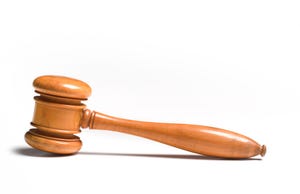Robotic Surgery Litigation Offers IP Lessons, Caveats
Originally Published MDDI February 2003NEWSTRENDS Maureen Kingsley
February 1, 2003
Originally Published MDDI February 2003
NEWSTRENDS
|
(Above) The da Vinci surgical system from Intuitive Surgical Inc., and (below) Zeus from Computer Motion. |
|
Even as robotically assisted surgery is touted in the media, a legal battle is raging between the market's two major players. Computer Motion Inc. (Goleta, CA), maker of the Zeus and other surgical robots, and Intuitive Surgical Inc. (Sunnyvale, CA), which makes the da Vinci system, have been engaged in a long series of patent-infringement lawsuits whose outcomes remain in question. Experts in intellectual property (IP) law say these cases offer lessons to makers of advanced products.
The legal battle began in 2001, when IBM and Intuitive filed a joint lawsuit against Computer Motion in the U.S. District Court for the District of Delaware. They alleged infringement of one of IBM's patents, to which Intuitive holds an exclusive license.
A Delaware jury ultimately found Computer Motion liable and awarded Intuitive $4.4 million for damages. The decision and award are now subject to judicial review and Computer Motion says it is exploring its options. These include requesting a new trial or a reduction in the damage award.
Meanwhile, Computer Motion has filed its own suit with the U.S. District Court for the Central District of California, claiming that Intuitive Surgical infringed on nine of its U.S. patents. The trial is expected to begin in April 2003.
Executives are advised to take note of such high-stakes IP lawsuits. Joel Covelman, an IP attorney for Levin & Hawes (Laguna Beach, CA), says, "Basically, these two companies are the current dominant players in an emerging technology field.” He describes this situation as one in which the company that controls the technology could very well end up controlling the market. This battle for market dominance provides an incentive for companies to wage a long and expensive war over the question of who owns the key technology, he explains.
Barbara Wrigley, an IP attorney with Oppenheimer Wolff & Donnelly (Minneapolis), agrees. She points out that this case demonstrates that “if you're trying to mimic or copy somebody else's product, you really need to do your homework about what patents are protecting that competitive portfolio.”
But that may be easier said than done. Covelman explains that most people don't realize that patent applications are confidential until the patent actually issues. “So [a company] can't go into the patent office and say, ‘Hey, let me see what applications are pending at the moment,'” he says. In some cases, “you don't know until after you've infringed that you've even infringed at all, because you don't know that the patent exists yet.” Preventing litigation in such cases is next to impossible, he says.
The ante is upped even higher when the two players doing the litigating are essentially each other's only competitors in a particular market. “I think nowadays, especially when the potential market is huge, companies do use patent litigation to harass their competitors,” Wrigley says. A typical example of this is when a competitor files a patent lawsuit against another competitor to keep it out of the market, delay its entry into the market, or send it “back to the R&D drawing board.” Wrigley explains that the corporate strategy in these cases “isn't to litigate, per se, but to defend one's turf.”
Covelman agrees. “Certainly, there are companies out there who have made a strategy of amassing large numbers of patents as a means of trying to protect their market share.” But he points also to companies that realize they are better off not fighting with each other and instead come to a cross-licensing arrangement. “That happened with Apple and Microsoft,” he says. “After years of litigation, they ultimately cross-licensed each other on various copyrights they had.”
A very different type of outcome, Covelman says, is one in which a company wins a lawsuit, and the monetary judgment is so large that “the winner basically takes over the keys to the [losing] company.” Yet another possibility is that one company acquires another as a result of the “crushing expense and damage to the product viability of the [losing] company,” he says.
Unpredictability seems to be the name of the IP game. Says Wrigley, “You can never prevent somebody from suing you, you can make sure you're in the best position to defend against that lawsuit. Research the prior art and understand the patent of your competitor, and how the patent claims would be interpreted by a court. An understanding of everything a competitor is doing will help you develop a viable defense.”
Copyright ©2003 Medical Device & Diagnostic Industry
You May Also Like


.png?width=300&auto=webp&quality=80&disable=upscale)

